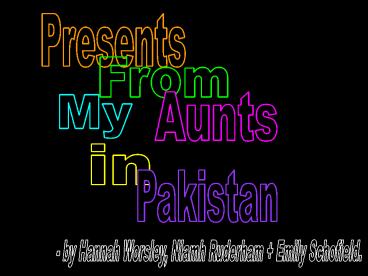Presents - PowerPoint PPT Presentation
1 / 10
Title:
Presents
Description:
e.g.. The salwar kameez are starkly different from the subdued Western clothes she prefers. ... My salwar kameez. didn't impress the school friend. who sat on ... – PowerPoint PPT presentation
Number of Views:61
Avg rating:3.0/5.0
Title: Presents
1
Presents
From
Aunts
My
in
Pakistan
- by Hannah Worsley, Niamh Ruderham Emily
Schofield.
2
The poem is written in free verse the phrases
are arranged loosely across the page. It is
divided into stanzas of varying length.
Loose trousers and tunic, traditionally worn by
Pakistani women.
The bright colours contrast from the normal
English clothes she wears.
They sent me a salwar kameez peacock-b
lue, and another glistening
like an orange split open,embossed slippers,
gold and black points
curling. Candy-striped glass
bangles snap ped, drew blood.
These words stand out from English words just as
the presents do from the English clothes she
usually wears.
Colours described vividly to show the
beautifulness of the clothes.
Shows that although the clothes are beautiful
they are dangerous, because they hurt her.
The poet remembers the clothes her aunts sent her
when she was a teenager.
The bracelets broke like her links with
Pakistan.
When she tried them on, she didnt feel right in
them she thought they were too nice for her.
3
Pakistan and England seem to contrast in every
possible way,
e.g.. The salwar kameez are starkly different
from the subdued Western clothes she prefers.
The fashions were changing around her fast and
she didnt know which culture she fitted into.
These presents felt stiff because she didnt wear
them very often.
Like at school, fashions changed in
Pakistan -the salwar bottoms were b r o a d and
stiff, then narrow.My aunts chose an
apple-green sari, silver-bordered f
or my teens.
These are memories of feeling confused and out of
place as a teenager
The poet remembers the clothes her aunts sent her
when she was a teenager.
When she tried them on, she didnt feel right in
them she thought they were too nice for her.
4
Shes more comfortable with the plainness of
English clothes than the bright colours of Salwar
Kameez
The presents make her feel out of place in
England.
I tried each satin-silken top - was alien in
the sitting-room.I could never be as
lovely as those clothes -
5
Child-like desire for something she cant have,
the desire to fit in in England rather than with
her own culture.
Shes more comfortable with the plainness of
English clothes than the bright colours of Salwar
Kameez.
I longedfor denim and corduroy.
My costume clung to me and I was
aflame,I couldn't rise up out of its
fire, half-English, unlike Aunt
Jamilia.
Refers to the legend of the of the phoenix rising
from the flames- but she cant re-create herself
like this.
6
Shows child- like desire for something she cannot
have.
I wanted my parents' camel-skin lamp
- switching it on in my bedroom,to consider
the cruelty and the
transformationfrom camel to shade, marvel at
the colours like stained glass.
The poet feels sorry for the camel who's skin was
used to make the lamp.She's reflecting on her
own negative views on change (moving from
Pakistan to England)
Shes thinking of all the time her culture
clashed, how she never wore the clothes from her
aunts, and how she wanted things that were
Pakistan that weren't her own.
She marvels things that are beautiful , like the
clothes from her aunt.
7
Shes reminiscing on the differences between her
culture and how they clash, like the time when
the jewellery was robbed from the car.
The theft of her mothers jewellery in England
could be a metaphor for England stealing her
Pakistani identity.
My mother cherished her jewellery
- Indian gold, dangling,
filigree, But it was stolen from our car The
presents were radiant in my wardrobe. My aunts
requested cardigans from Marks and
Spencer's.
Humorous but regretful- she never wore them. She
feels as though the presents are nice looking but
she isnt good enough for them.
8
The schoolfriends reaction to clothes contrasts
with the poets so she doesnt fit in in England
either
My salwar kameez didn't impress the school
friendwho sat on my bed, asked to see my
weekend clothes.But often I admired the
mirror-work, tried to glimpse
myself in the miniatureglass
circles, recall the story how the three of
us sailed to England. Prickly heat
had me screaming on the way. I ended up in a
cotIn my English grandmother's
dining-room, found myself alone, pl
aying with a tin-boat.
She likes the Pakistan clothes but cant feel
attached to them. She also wants to see her
identity
The real boat took her away from her homeland
She must have been very young when she left
Pakistan for England
9
She cant remember Pakistan properly she has to
imagine it
The split in Pakistan is compared to her confused
identity split between England and Pakistan
I pictured my birthplace from fifties'
photographs. When I was olderthere
was conflict, a fractured land throbbing
through newsprint. Sometimes I saw Lahore
- my aunts in shaded rooms,screened
from male visitors, sorting presents,
wrapping them in tissue
Her knowledge of Pakistan is based on what shes
read and heard
This refers to the war when eats Pakistan split
to become Bangladesh
Brings the poem back to the original theme
10
Less positive images of Pakistan
Or there were beggars, sweeper-girls and I was
there - of no fixed
nationality,staring through fretwork
at the Shalimar Gardens.
Sums up her feelings of not being English or
Pakistan
Theres a barrier stopping her from being part of
Pakistan































